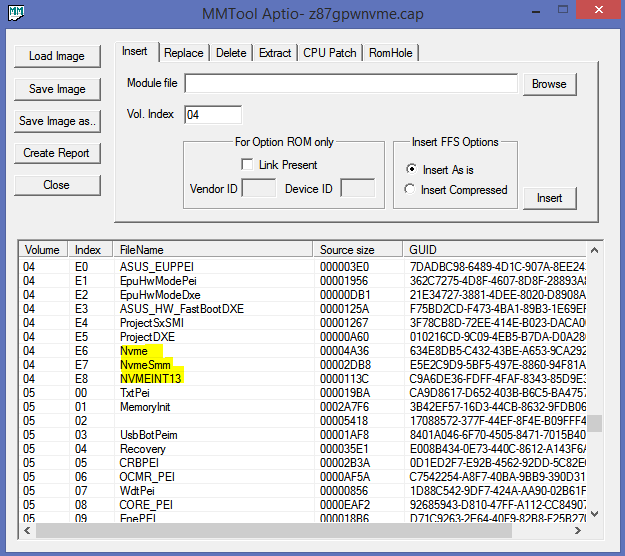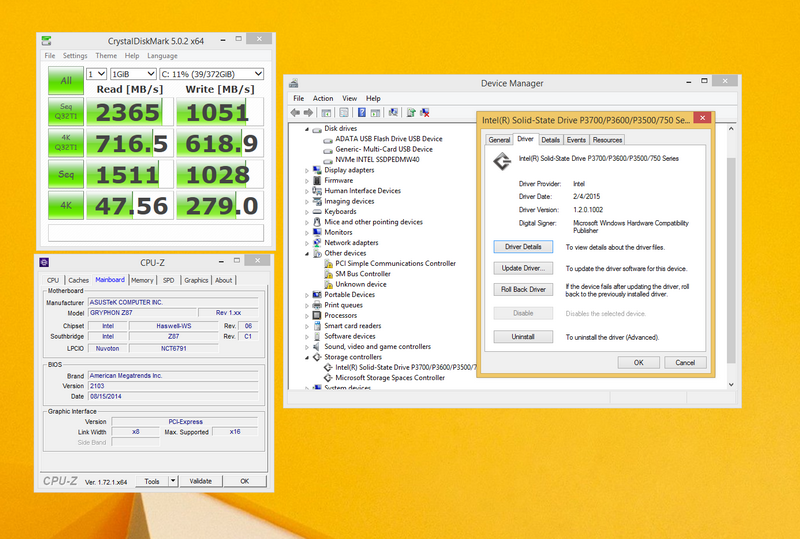You are absolutely right. That is why I have moved the last posts regarding the AHCI model of the Samsung SM951 and parts of your post into >this< better matching thread.
@jimmytim
your cpu?
i have asus sabertooth x79 and i7 3930k … i’m going to by intel 750 ssd.
what about pci 3.0 ?
with your read speed over 2gb/s it should use pci 3.0 …
@ imsims:
my cpu is 3930k
and yes it is pcie gen 3
EDIT by Fernando: Fully quoted text removed and replaced by a simple “@ xyz” (to save space)
@lordkag
I tried 2 different BIOS images on my ASRock X79 Extreme4:
Before: RST 13.5, RSTe 4.1, no NVME modules, microcode updates
Mod 1: untouched RST (12.7)/RSTe, no NVMe modules, only microcode updates
Mod 2: RST 13.5, RSTe 4.1, integrated NVMe modules of ASRock Z97 Extreme4, microcode updates
Results:
Before: NVMe working, RST firmware freezes if “Ultra fast boot” enabled (firmware 0.0.0.0), works if disabled
Mod 1: NVMe working, RST firmware freezes if…
Mod 2: no change in NVMe detection/performance, RST and RSTe firmware freezes if…
So apparently the ASRock UEFI developers forgot to remove the NVMe driver.
It’s really strange, that RST and RSTe firmware freezes if “Ultra fast boot” is enabled.
It gets even weirder: in UEFI setup everything is working fine, I can create and delete RAID volumes.
But if Windows 8.1 (64bit) is started up, the RST management console shows firmware 0.0.0.0 and
crashes if I want to change settings or refresh the drives list.
Since the firmware freezes during Windows boot, I can’t see any drives in Explorer or device manager.
@Fernando
I can’t upload any files using IE 11 or FF39. What’s going on here?
Uploading multiple files does not work at all, but I can see Network activity (heavy sending load).
Uploading a single file shows a progress bar, but the files are not attached.
It should work with all browsers, but you have to do it the correct way. Not all file extensions are allowed (due to restrictions done by the Web Hoster named Xobor).
Since this is an off-topic question and my answer may be interesting for other Forum members as well, I will write a short guide about how to insert pictures or attach files as soon as I have the needed time. You will find the guide within >this< Sub-Forum.
@mr_nuub
Once again, there is no NVMe driver in the original UEFI firmware. If it was anything NVMe related, you should see the SSD identified as such in the BIOS/UEFI screen. What Asrock has provided is an extended search of attached drives, especially from PCIe links. Apparently this can “catch” the NVMe device as a mass controller, but nothing more than that and it is beyond my capabilities on how NVMe protocol is supported without NVMe code, at least until OS/driver takes over. If you do plan to keep the SSD, inserting the NVMe EFI drivers is highly recommended. As for your Ultra Fast Boot freeze, this is hardly a surprise. It should work by skipping some detection/initialization routines, which conflicts with the extended scan and NVMe SSD. The way I see it, you have too much expectations when you want your NVMe SSD to be bootable in your unsupported board AND everything to work as before, if not better. Some users would be happy with just the first one. If you can’t get a fix from Asrock, you should decide which is more important to you: NVMe or Ultra Fast Boot.
NVMe support in BIOS is not required if the SSD has it’s own boot ROM. I was able to boot an Intel P3600 on Z77 and X79 boards.
@ h00bi:
Welcome at Win-RAID Forum!
Thanks for this interesting find and report.
Regards
Dieter (alias Fernando)
Hi guys!
I have a problem with my setup. I cant detect any NVMe drive and im not sure if its BIOS or related to hardware.
I bought the MSI Turbo U.2 Host card and connected an Intel DC P3500 with an amphenol cable. Nothing shows up in either BIOS or Windows 8.1 install. (BIOS version 1.9 rel 2015/07/22 and Intel NVMe drivers loaded in windows installer). I had the ROM setup in BIOS for UEFI only, not legacy. Could it be that the PCIe retimer/reclocking on the MSI devices hides the drive from BIOS somehow?
Have you got any idea?
The MSI U.2 i got is this:
http://www.scan.co.uk/products/msi-turbo…sds-to-motherbo
My motherboard is this:
http://www.asrock.com/mb/Intel/X99M Extreme4/
Intel drive: 2.5" … Not HHHL
http://www.intel.com/content/www/us/en/s…500-series.html
Amphenol cable:
http://www.amphenol-datacenter.com/IAC-SFF-8639-68P-Straight- PWR-36P-HD-MiniSAS.htm
Pci devices shown in efi shell:
Seg Bus Dev Func
— — — ----
00 00 00 00 ==> Bridge Device - Host/PCI bridge
Vendor 8086 Device 2F00 Prog Interface 0
00 00 01 00 ==> Bridge Device - PCI/PCI bridge
Vendor 8086 Device 2F02 Prog Interface 0
00 00 03 00 ==> Bridge Device - PCI/PCI bridge
Vendor 8086 Device 2F08 Prog Interface 0
00 00 05 00 ==> Base System Peripherals - Other system peripheral
Vendor 8086 Device 2F28 Prog Interface 0
00 00 05 01 ==> Base System Peripherals - Other system peripheral
Vendor 8086 Device 2F29 Prog Interface 0
00 00 05 02 ==> Base System Peripherals - Other system peripheral
Vendor 8086 Device 2F2A Prog Interface 0
00 00 05 04 ==> Base System Peripherals - PIC
Vendor 8086 Device 2F2C Prog Interface 20
00 00 11 00 ==> Device does not fit in any defined classes -
Vendor 8086 Device 8D7C Prog Interface 0
00 00 14 00 ==> Serial Bus Controllers - USB
Vendor 8086 Device 8D31 Prog Interface 30
00 00 16 00 ==> Simple Communications Controllers - Other communicati
Vendor 8086 Device 8D3A Prog Interface 0
00 00 19 00 ==> Network Controller - Ethernet controller
Vendor 8086 Device 15A1 Prog Interface 0
00 00 1A 00 ==> Serial Bus Controllers - USB
Vendor 8086 Device 8D2D Prog Interface 20
00 00 1B 00 ==> Multimedia Device - UNDEFINED
Vendor 8086 Device 8D20 Prog Interface 0
00 00 1C 00 ==> Bridge Device - PCI/PCI bridge
Vendor 8086 Device 8D10 Prog Interface 0
00 00 1C 03 ==> Bridge Device - PCI/PCI bridge
Vendor 8086 Device 8D16 Prog Interface 0
00 00 1D 00 ==> Serial Bus Controllers - USB
Vendor 8086 Device 8D26 Prog Interface 20
00 00 1F 00 ==> Bridge Device - PCI/ISA bridge
Vendor 8086 Device 8D47 Prog Interface 0
00 00 1F 03 ==> Serial Bus Controllers - System Management Bus
Vendor 8086 Device 8D22 Prog Interface 0
00 02 00 00 ==> Display Controller - VGA/8514 controller
Vendor 10DE Device 1401 Prog Interface 0
00 02 00 01 ==> Multimedia Device - UNDEFINED
Vendor 10DE Device 0FBA Prog Interface 0
00 04 00 00 ==> Network Controller - Ethernet controller
Vendor 1969 Device 10A1 Prog Interface 0
BR
Martin
EDIT by Fernando: Put the PCI device list into a spoiler (to save place and clarity
@ sparx:
Hello Martin,
welcome at Win-RAID Forum!
The BIOS of my ASRock Z97 Exreme6 doesn’t show the Intel 750 PCIe SSD either. Nevertheless it worked flawlessly and was bootable.
I don’t know, but - as I have written above - the BIOS may not show the PCIe connected Storage Devices.
Regards
Dieter (alias Fernando)
follow Fernando’s instruction …i’m able to boot intel 750 on GRYPHON Z87

Since I cannot see the pictures gtishtar wanted to post, here they are:


hi to all of you.
finally i get an intel 750
here is my first thoughts…
My system
Asus Sabertooth X79 + 3930k.
Samsung 830 x2 Raid 0
Intel 750 SSD
I use a second win install to clone C: from Raid0 to Intel 750 SSD
with Acronsi True 2015.
i have to said that after finissh 100 % acronis report some strange errors : Unable to some sectors.
after saying acrons to ingnore errors, i reboot and found in Boot List into bios
Window boot Manager (Intel 750)
and boot from there
here my bench
what do you think?
whats wrong about poor 4k QD32 write?
It was not a good idea to clone a system partition, which has been within a RAID array, into a "clean" SSD, which is not running in RAID mode at all.
It is fine.
I don’t know.
By the way: Anvils Storage Utiity and AS_SSD are better benchmark tools for SSDs than CrystalDiskMark.
that’s my finally test with x79
i think the main problem of this SSD is very low endurance and HIGH written data.
2 TB written in one day of tests and vmware working.
with my 830 raid 0 only 14TB in 2 years!
something is strange with internal written data of intel firmware.
so i think i will return to amazon… with only 127 TB endurance i will lost it in about 2 months!
bah… very bad intel …
it’s crazy only 70GB /day with 1,5 Gb/s you wll be out of day in 60 sec…
@ imsims:
Thanks for your interesting report.
Is there any proof for this statement?
I have read a lot of reviews about the Intel 750 Series SSD, but I have not yet seen any criticism about its missing endurance. The only negative point was always the extremely long boot time, but this issue seems to be caused by the NVMe initialization.
By the way: It is hard to believe, that Intel has thrown such bad SSD with such high price on the consumer market.
i read the whole thread, so if i undersand, no one can confirm that Intel 750 series SSD could be bootable on all X79 chipsets? I’m right or not?
I would like to buy one for my GA-X79-UD3, but if it does not work, i’ve lost lot’s of $$$$.
I’ve read that 13.x OROM can support these Intel 750???
How i can manage to be sure before buying??
Thanks for help
Ghostearth.
You are right, there is no guarantee, but imsims’s report verifies, that it is possible to boot off the Intel 750 SSD with an Intel X79 Chipset system.
Where did you read that? According to my knowledge the Intel RAID ROM resp. Intel EFI RaidDriver BIOS modules have nothing to do with the support of Intel’s 750 Series SSDs.
Thanks Fernando.
Here without proof :
http://forums.tweaktown.com/gigabyte/480…html#post497301
Ghostearth.
http://www.intel.com/content/www/us/en/s…-750-brief.html
70GB /day for 5 year = 127 TB.
moreover it seems that written data increase fastwe than my sam 830 raid 0.
as i said 2xRaid0 830 have 14TB data written from march 2012 more than 3 years (7TB each)
my new intel 750 as already 2 TB written in 2 days.
if i substract first 400gb of True Image disc clone
it takes about 1.5 TB data written win fresh win8.1 install , visual studio 2015 install, about 150gb /400 busy
and som benchk.
i think is too much fast data written grou up, and low endurance in datasheet 70GB /DAYS.
moreover intel is not saying the true as datasheet report same endurance for 400gb vers and 1.2TB version.
instead intel P3x00 datasheet report different endurance for different size version, as expected!
i will return to amazon next week, becouse at this speed i will get 127TB written in 6 months!
i think intel as get very poor nand to get comsumer low price.
last think intel P3600 400gb version cost about 650 euros so not much more,
but have 2.19 PB data written endurance! over 20 TIMES!
intel P3700 400gb about 900euros have 8 PBW endurance 40 times!